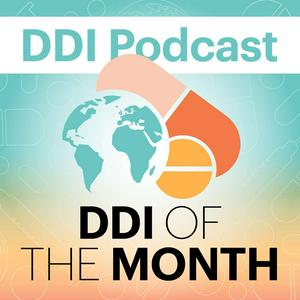9 afleveringen

Episode 9: Decoding P-glycoprotein Interactions: Inhibitors, Inducers, and Clinical Relevance
19-12-2025 | 20 Min.
In this ninth edition of DDI of the Month, host Prof. dr. David Burger welcomes two leading experts from Switzerland, Dr Claire Coumau and Dr Chantal Csajka, for an in-depth discussion on P-glycoprotein (P-gp)–mediated drug–drug interactions.The episode is centered around their recent publication in Clinical Pharmacokinetics: “A Systematic Review and Classification of the Effects of P-glycoprotein Inhibitors and Inducers in Humans, Using Digoxin, Fexofenadine, and Dabigatran as Probe Drugs.”P-glycoprotein plays a key role in drug absorption and disposition, yet its interaction potential has long been less clearly defined than that of hepatic enzymes such as CYP3A. In this conversation, the authors explain why they set out to systematically review human data, propose a clinically meaningful classification of P-gp inhibitors and inducers, and highlight important similarities — and differences — between P-gp and CYP3A interactions.Tune in to hear about:Why a human-only systematic review of P-gp interactions was neededHow P-gp inhibitors and inducers can be classified using exposure-based criteriaWhich drugs qualify as moderate or potent P-gp inhibitors or inducersWhy strong P-gp modulators are relatively rare compared to CYP3A modulatorsThe concept of short-term inhibition followed by time-dependent inductionThe role of probe drugs such as digoxin, dabigatran, fexofenadine—and the potential of edoxabanAn insightful episode for clinicians, pharmacists, and researchers involved in managing and studying drug–drug interactions. Don’t miss it—listen now!

Episode 8: Metamizole Meets Quetiapine: A Metabolic Interaction
02-7-2025 | 20 Min.
DDI of the Month returns with Episode 8! Tune in as we explore new data on the metamizole-quetiapine interaction and its clinical impact.In this episode of DDI of the Month, we’re excited to welcome two distinguished quests from Germany: Dr. Arnim Gaebler and Dr. Michael Paulzen. Together, we dive into their recent published paper in the British Journal of Clinical Pharmacology, titled: “Discovering interactions in polypharmacy: Impact of metamizole on the metabolism of quetiapine”Metamizole, a widely used analgesic in several European countries, has long been considered safe in acute care. However, with an increasing number of indications for chronic use being explored, managing potential drug interactions is becoming more important. Despite being on the market for decades, little is known about metamizole’s interaction potential.New evidence suggests that metamizole may substantially reduce plasma concentrations of quetiapine – an antipsychotic frequently prescribed in psychiatric and geriatric populations – by more than 50%. The likely mechanism? Induction of CYP3A4, the key enzyme responsible for quetiapine metabolism.Tune in to hear:•The motivation behind the study•Surprising finding from the KONBEST database analysis•Why metamizole may be a stronger enzyme inducer than previously though•The implications for therapeutic drug monitoring (TDM)•How these finding could influence prescribing practices in psychiatryDon’t miss this insightful conversation – listen now!

Episode 7: Pharmacokinetics and Green Tea: The Catechin Connection
19-2-2025 | 21 Min.
In the seventh episode, Prof. Dr. David Burger discusses with Nicki Kyriacou the review article: “Green tea catechins as perpetrators of drug pharmacokinetic interactions”. You might think: “Green tea?– I drink it all the time! “But is it really that innocent?Tune in now as we explore how catechins-compounds found in green tea, like (-)-epigallocatechin-3-gallate – can impact drug pharmacokinetics. These compounds can alter drug solubility, transporter activity, and metabolism, potentially affecting the concentration of therapeutic drugs such as atorvastatin, digoxin, and sildenafil.The following key topics will be discussed in the podcast:The scope and intensity of green tea interaction studies;Different green tea formulations and their impact on drug interactions;Relevance for specific patient populations (especially cardiovascular medications);Why green tea reduces most drug concentrations – but increases sildenafil levels;The role of timing in green tea consumption vs. co-medication; andPractical guidance for clinicians and pharmacists to assess potential interaction.Don’t miss this insightful discussion on the drug interaction potential of green tea and the practical takeaways for health professionals!

Episode 6: The Role of P-gp and the Impact on Clinical Outcomes | Leonie Bogaard
09-1-2025 | 22 Min.
In this episode of the DDI of the Month podcast, Dr. David Burger dives into a critical topic: P-glycoprotein (P-gp)-mediated Drug-Drug Interactions with Dr. Leonie Bogaard. Join us as we explore the role of P-gp, a key transporter involved in drug absorption and elimination, and its impact on clinical outcomes.In this episode, we discuss:• How P-gp modulation affects systemic drug exposure.• The challenges in managing DDIs due to overlap with enzymes like CYP3A4.• Practical recommendations for identifying and addressing P-gp-related DDIs in clinical settings.Don’t miss this engaging discussion, featuring insights from recent research and expert recommendations on improving patient care while minimizing risks.

Episode 5: Enhancing Patient Safety | Gianluca Trifirò
25-10-2024 | 20 Min.
In our latest episode, we dive into an important study by Dr. Massimo and Dr. Gianluca which examins the agreement between different drug interaction checkers (ICs) when evaluating interactions involving widely used proton pump inhibitors (PPIs). PPIs are frequently prescribed for treating acid-related conditions and preventing medication-induced ulcers, especially in older patients with multimorbidity and polypharmacy. These interactions are often complex, involving increased gastric pH (reduction of absorption) and metabolism through CYP3A4 and CYP2C19 enzymes. However, this study reveals significant inconsistencies between the summary of product characteristics (SPCs) and five individual widely-used ICs. The podcast covers: - How different ICs (like INTERCheck WEB, Micromedex, Lexicomp, Epocrates, and drugs.com) identify and classify potential interactions with PPIs (including omeprazole, esomeprazole, lansoprazole, pantoprazole, and rabeprazole).- The alarming discrepancies between the IC data and official product summaries (SPCs), and how this impacts clinical decision-making. - Why healthcare professionals should use multiple sources and collaborate closely in managing complex medication regimens, especially in elderly patients. Listen to learn more about the findings of this study and how to improve patient safety and ensure the accurate identification of drug interactions that can affect patient outcomes.
Meer Wetenschap podcasts
Trending Wetenschap -podcasts
Over DDI of the Month Podcast
Luister naar DDI of the Month Podcast, Ondertussen in de kosmos en vele andere podcasts van over de hele wereld met de radio.net-app

Ontvang de gratis radio.net app
- Zenders en podcasts om te bookmarken
- Streamen via Wi-Fi of Bluetooth
- Ondersteunt Carplay & Android Auto
- Veel andere app-functies
Ontvang de gratis radio.net app
- Zenders en podcasts om te bookmarken
- Streamen via Wi-Fi of Bluetooth
- Ondersteunt Carplay & Android Auto
- Veel andere app-functies


DDI of the Month Podcast
download de app,
luisteren.




































